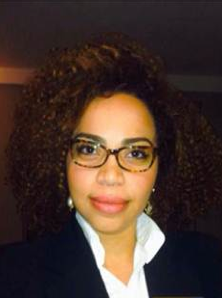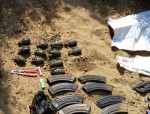Rasha Athamni was the first Israeli selected to represent the nation as a youth delegate to the United Nations General Assembly in New York, serving during the 69th session from September through November 2014. The youth delegates program was started 1981 but, until then, Israel had not chosen to participate.

Athamni, 29, was raised in the Israeli Arab town of Baka Al-Gharbiyah, the youngest of nine children and the first in her family to graduate high school and university; her parents do not read or write. She earned a bachelor’s degree in psychology and English literature from Jerusalem’s Hebrew University and is currently working on her master’s in English literature. She also guides tours of Israel’s parliament, the Knesset. In her first interview with media, Athamni spoke with the Media Line.
TML: What prompted you to apply to become a United Nations youth delegate … and on behalf of the state of Israel, no less?
RA: Ever since I was a child, my biggest dream was to become a member in this UN society because that’s the ideal, the universality, people go out and help others that are in need. I am a citizen of Israel and I have a right to apply and to go through the interviews, and that’s what I did. When I got the acceptance letter, I was just thrilled. Hundreds applied after there was a call for applicants published on the Ministry of Foreign Affairs’ website. Only 12 or 13 were invited to go through the interview and I was one of them. And then, after the final decision, I got be the first and only youth delegate for Israel for the UN.
TML: Is there a distinction between Israeli Arabs and Palestinians living in Israel and, if so, what is the difference?
RA: Well, it’s a bit complicated – that’s the best adjective that I can use to describe it. It’s a question every Arab citizen in Israel has to answer sooner or later. On the one hand, my mother’s side is Arabic; my parents are Arabs. On the other hand, I live in the centre of Israel and I have an Israeli ID and passport. But, I’m not Jewish, so it’s very complicated. You really need to establish a sense of yourself that is solid enough to represent Israel, especially at the UN.
TML: How did you end up where you are today, studying for a second degree at Hebrew University?
RA: I was primarily motivated by my mother because, ever since I was a little kid, she told me it was very important for me to go to school because that would be the best [chance] that I would have in our society and that I should appreciate that because she herself couldn’t do it. All she really wants in life is that one of her kids becomes a doctor. I didn’t become a doctor. That was disappointment number one, but I did get a degree in psychology and English literature from the best university in Israel, and now I’m doing my master’s in English literature.
TML: How did you get involved with the Israeli government?
RA: About two years ago, the students association at the Hebrew University was looking for a coordinator for a coexistence project that brought together eight Jewish and eight Arab Israeli women students. I applied and got the job. It was a very fascinating year for me and for each one of those students that participated.
It’s very funny when you think about it. Even though they study the same courses and they go to the same classes, you’d see the majority of Jewish students would sit on one side of the hall and the minority on the other side, so there’s this psychological barrier between them. After they got to learn about each other and meet each other, then the hate recedes. That’s beyond nationality, ethnicity or religion. That’s when that barrier just disappeared and they started to sit and study with each other. The Jewish girl would go and teach the Arab girl Hebrew and the Arab girl would go and teach the Jewish girl English.
One of the girls used to work as a tour guide in the Knesset. I needed to support myself, so I got information from her and I applied for the job, and I still give tours in Arabic, Hebrew and English.
TML: How did your family react to that?
RA: My family is very apolitical. They grew up in a society where it was taboo to talk about politics because for them that meant either jail or exile. For me, now, that sounds like paranoia, being afraid to express your own opinion because of your background. There is some truth in that, but they just took it to the extreme. My family was really scared that my being involved in politics or social change or anything that has to do with the state of Israel could mean the demise of my image in my own community, and that’s a fear that they’re still experiencing. My mother, every time I call her, tells me that I shouldn’t do that and it’s never too late back out.
TML: Was there backlash from other Arabs or from Arabs who happen to be of Israeli descent?
RA: At the UN, no. They’re all very diplomatic. Whenever I introduced myself, they said, “Good job as the youth delegate of Israel,” even though that person was from Jordan, Yemen or Egypt. It just didn’t make any sense because they would attack Israel in the committee for human rights but they had no problem talking to an Israeli in the corridors.
TML: You said you represented Israel, responding to different discussions that go on in the United Nations.
RA: After I was picked to represent the youth of Israel, I had a two-month training period at the Foreign Ministry, then traveled to New York for three months, where my job was to summarize the meetings of the committee on human rights. I attended informal briefings at which UN delegates would discuss the terms and wordings of the resolutions, and would also go to events that the delegation would be invited to.
My most prominent moment came when I delivered a speech on behalf of the youth of Israel. This was at the opening of the first meeting of the human rights committee. When it was time for the youth delegation to speak, they spoke about the rights of the youth, why is it really important. Youth belong to a very strange category because they are not children and are not yet adults, so we tend to disregard their needs. A person needs to get a first degree and a second degree in order to just have the opportunity to apply for a job. These are just some of the topics that we covered, along with health, gender equality and education, which is very basic in our country but in other countries is a goal to strive for.
TML: Two of your passions are human rights and social responsibility. What issues were most challenging?
RA: Whenever I attended meetings of the committee for human rights, I had to sit in Israel’s space and, just sitting there, I felt terrified. On my first day, to my left there was Iran. In front of me was Egypt and Jordan, and behind me was Qatar. I felt what Israel feels like at the international level, being under attack even though this was my first experience hearing the attacks. What was interesting for me was how every country would attack Israel disregarding what they do within their own borders. You’d hear the delegation from Syria attacking Israel for violations on human rights, which doesn’t make much sense. A country representing their own people needs to address their own problems rather than pretending that everything is fine within their own borders, and then attack[ing] another country and join[ing] with others who are against it. That country most of the time happens to be Israel.
TML: As an Israeli citizen, how did that make you feel?
RA: It didn’t feel fair. There are always two sides to a conflict. It seemed that one side is more represented than the other side – that other side is Israel. I just felt that someone needs to be given a floor to express and talk about [the] good things that Israel is doing: the humanitarian assistance that Israel is giving to Gaza and the West Bank. There is a project called Save a Child’s Heart. Every Tuesday, a child from Gaza goes to Israel for heart surgery. There are also negatives, but you can’t just focus on that. There is much hope that is being missed when everyone focuses on the bad stuff.
Read more at themedialine.org.

